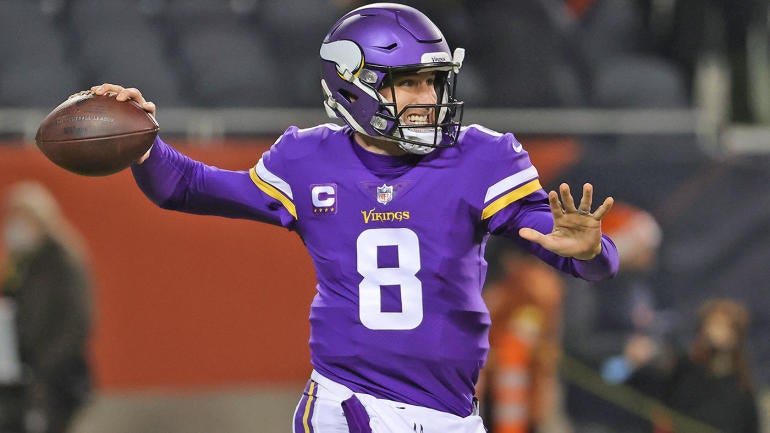
The Vikings' playoff hopes came to a disappointing end against the Packers with unvaccinated quarterback Kirk Cousins unable to play in Minnesota's biggest game of the season after testing positive for COVID-19. Sunday's night 37-10 defeat assures the 7-9 Vikings of back-to-back losing seasons for the first time since 2014, which was Mike Zimmer's first year as head coach. Cousins will be back for Sunday's regular-season finale versus the Bears.
The fallout from missing the playoffs for a second consecutive season could be immense. There is plenty of speculation that Zimmer will be fired once the season ends. General manager Rick Spielman may be on the hot seat as well. Cousins also faces an uncertain future in Minnesota. Whether the Cousins era comes to an end is complicated by his contract.
Cousins' contract
Cousins was signed in 2018 as an unrestricted free agent to the NFL's first lucrative fully guaranteed veteran contract after playing under franchise tags for consecutive seasons with the Washington Football Team. He received a three-year, $84 million deal (worth a maximum of $90 million through incentives).
Minnesota's tight salary cap and the way Cousins' contract was structured created leverage for him to get a new deal during the 2020 offseason. The contract contained a no-trade clause and language preventing Minnesota from designating Cousins as a transition player. It would have been $44.64 million to put a third and final franchise tag on Cousins in 2021.
The Vikings created just over $10 million of much-needed salary cap relief by signing Cousins to a two-year, $66 million contract extension (worth up to $70 million through incentives) with $61 million fully guaranteed that March. Cousins' $35 million 2022 base salary in the final year of the contract was guaranteed for injury at signing. The $35 million became fully guaranteed this past March 19 on the third day of the 2021 league year. Cousins' has the NFL's third-largest 2022 salary cap number at $45,166,668.
The early vesting of the 2022 base salary guarantees eliminates the possibility of the Vikings cutting Cousins. The Vikings would be left with $45,166,668 of dead money, which is a salary cap charge for a player no longer on a team's roster. Minnesota's dead money would be the same as Cousins' 2022 cap number.
Cousins' performance
Cousins has been one of the NFL's better quarterbacks statistically since signing with the Vikings in 2018. He's thrown for 16,137 yards while completing 68.4% of his passes with 121 touchdowns and 36 interceptions for a 103.0 passer rating. Cousins ranks fourth in the NFL in completion percentage, fifth in touchdown passes, sixth in passer rating and seventh in passing yards during this span (minimum of 896 pass attempts where applicable). He also has the league's fifth-best interception percentage at 1.71% over the four seasons. On average, Cousins can be counted on for slightly more than 4,000 passing yards with 30 touchdowns and nine interceptions in a season.
The Vikings didn't sign Cousins to compile statistics. He was brought in to help a 2017 Vikings team that advanced to the NFC Championship Game on the strength of the league's best defense to be a consistent Super Bowl contender.
It hasn't worked out that way. The Vikings have missed the playoffs in three of Cousins' four seasons in Minnesota. The only playoff appearance was during the 2019 season when a 10-6 Vikings team beat the Saints in the wild card playoff round before losing to the 49ers in the divisional playoffs.
The defense has steadily declined during Cousins' tenure with the Vikings. Right before his arrival, the 2017 Vikings were first in total defense, points allowed and yards given up per pass play. This unit was also second in passing yards and rushing yards. The 2021 Vikings are in the conversation for the league's worst defense. The current team doesn't rank better than 25th in any of these categories, including 31st in total defense. The 2020 Vikings were only marginally better in most of these categories.
Minnesota's defensive shortcomings over the last two years don't absolve Cousins. One of the biggest criticisms of Cousins has been an inability to rise to the occasion in big games. The Vikings have a 4-21 regular-season record against playoff teams with Cousins in the lineup. This includes teams that have already clinched a playoff berth this season.
Cousins playing out contract
Cousins playing out the final year of his contract probably doesn't have much chance of occurring unless Spielman is retained as general manager. Keeping status quo might have appeal because Cousins, at the least in the short term, is better than the alternatives. The Vikings hedged their bets by drafting Kellen Mond in the third round of last year's NFL Draft. Mond's inability to supplant Sean Mannion as Minnesota's top backup quarterback suggests he isn't starting material next year.
Unfortunately for the Vikings, the 2022 quarterback draft class isn't comparable to recent years. There's a chance a quarterback won't be taken in the top 10 since 2013 when EJ Manuel was the first one selected with the 16th overall pick.
It will be tougher to improve a porous defense with Cousins' $45,166,668 cap number on the books given Minnesota's salary cap situation. Without a significant improvement on defense, the Vikings would likely be fighting for a wild card playoff spot at best. The Vikings currently have the NFL's fifth-most 2022 cap commitments at $212.8 million with 47 players under contract and $2.111 million of unused cap space that can be carried over to next year, according to NFLPA data. Only the top 51 salaries (i.e.; cap numbers) matter with offseason salary cap accounting rules. The 2022 salary cap is projected to be at the $208.2 million ceiling the NFL and NFLPA agreed to in May.
Using a franchise or transition designation on Cousins in 2023 wouldn't be feasible. The procedures outlined in the NFL Collective Bargaining Agreement dictate that a third Cousins franchise is tag is 144% of his 2022 salary, which is essentially his cap number for these purposes. It would cost Minnesota $64.8 million to franchise Cousins. The transition tag at a 20% raise wouldn't be cheap either. The cost would be $54 million.
The compensatory draft pick the Vikings would potentially get in 2024 for losing Cousins in 2023 free agency wouldn't approach the draft capital he should be able to command in an offseason trade. The most the Vikings would get is a fifth-round pick because Cousins would have 10 or more accrued seasons (years of service for free agency).
Cousins wouldn't have much incentive to restructure his contract to create 2022 cap room given his lame duck status. Although the Vikings have automatic salary conversion rights in Cousins' contract, those can't be exercised when voiding/dummy contract years need to be added to generate space, like in this case since 2022 is his contract year. Cousins' consent is required.
Trade
Trading Cousins is Minnesota's most intriguing option and most challenging. It's a possibility if Spielman keeps his job but the most likely outcome with both a new head coach and general manager hired.
Teams looking to acquire a veteran starting quarterback could have plenty of options besides Cousins. Deshaun Watson sits in trade limbo with the Texans because of sexual assault and misconduct allegations. It remains to be seen whether Aaron Rodgers and the Packers have repaired their relationship enough for him to return to Green Bay next season. Rumors of Russell Wilson asking for a trade if Pete Carroll remains Seahawks head coach are rampant. The Raiders could look to move Derek Carr rather than give him an extension in his contract year. Jimmy Garoppolo's days in San Francisco have seemed numbered ever since the 49ers moved up to third overall pick in last year's draft to select Trey Lance as the quarterback of the future.
The acquisition costs for Rodgers, Watson and Wilson will be much greater than for Cousins. Minnesota's best-case scenario in trading Cousins would be similar compensation as in the Carson Wentz trade. The Colts gave up a 2021 third-round pick (84th overall) and a 2022 first-round pick to obtain Wentz. The worst-case scenario would be along the lines of Alex Smith's 2018 trade to the Washington Football Team. The Chiefs received a 2018 third-round pick (78th overall) and starting cornerback Kendall Fuller, who was still on his rookie contract.
In addition to the quarterback supply potentially impacting a Cousins trade market, the number of teams willing to absorb his $35 million 2022 base salary and give up significant draft capital could be extremely limited. Getting a team to take on all of Cousins' 2022 salary would leave the Vikings with a $10,166,668 cap charge or dead money relating to him.
It's probably going to require the Vikings to eat a good portion of Cousins' salary on the way out the door to facilitate a trade. In the NFL, this is done by converting some portion of a player's salary into signing bonus prior to a trade. For example, the Panthers are paying Teddy Bridgewater $7,062,500 because of a salary conversion before his trade last April to the Broncos.
The Vikings would likely need to be comfortable with converting $10 million to $15 million of the $35 million into signing bonus to move Cousins. The acquiring team taking on $20 million to $25 million of Cousins' 2022 base salary would be consistent with last offseason's trades involving quarterbacks Jared Goff, Matthew Stafford and Wentz. The Rams, Colts and Lions absorbed $20 million, $25.4 million and $25.65 million of 2021 salary in their respective trades for Stafford, Wentz and Goff. The Vikings would still pick up anywhere from $20 million to $25 million in cap relief with this type of pre-trade salary conversion.
There are two teams that have a history with Cousins in need of an upgrade at quarterback. Broncos general manager George Paton was the Vikings vice president of player personnel/assistant general manager from 2015-20. Denver could be a preferred destination for quarterbacks on the trading block. Rodgers had his sights set on playing in Denver during his offseason rift with the Packers. Denver was also reportedly an acceptable landing spot to a disgruntled Watson over the offseason.
The Browns have underachieved this season largely because of quarterback Baker Mayfield. Some of Mayfield's ineffectiveness can be attributed to him playing most of the season with a torn labrum in his non-throwing left shoulder, which requires surgery to repair. Browns head coach Kevin Stefanski was Cousins' offensive coordinator and position coach during his first two seasons in Minnesota.
A trade centered around Cousins going to Cleveland for Mayfield (not straight up) could make sense. Minnesota might prefer 2018's first overall pick over taking a quarterback with their 2022 first-round pick, which currently would be 12th. Eating the same amount of salary as suggested shouldn't be necessary by taking back Mayfield's fully guaranteed $18.858 million fifth-year option for 2022 in the deal. The Browns would be losing $16.142 million of 2022 cap space compared to having Mayfield's fifth-year option if absorbing Cousins' full $35 million 2022 salary.
The Steelers don't have a quarterback on the roster capable of being the full-time replacement for Ben Roethlisberger, who is expected to retire. There also isn't enough draft capital to seriously pursue Rodgers, Watson or Wilson. Cousins might be a viable alternative for a team still mathematically alive for making the playoffs as an AFC wild card. Presumably, the Steelers aren't thinking of rebuilding.
A contract extension would likely also be a necessity since the acquiring team would be inheriting Minnesota's problem about a franchise or transition tag in 2023 without one. A new deal presumably would free up 2022 cap space for the acquiring team.
Contract extension
A contract extension with the Vikings can't be dismissed although a new deal seems much more likely because of the trade. The considerations are largely the same whether an extension occurs with the Vikings or an acquiring team.
Cousins has consistently capitalized on his circumstances for maximum financial gain. Unlike other quarterbacks, he embraced the franchise tag game to become the league's highest-paid player when he initially signed with the Vikings. His extension two years later made him the NFL's fifth-highest-paid player by average yearly salary. Only three quarterbacks -- Rodgers, Wilson and Matt Ryan -- have made more than the $115 million Cousins has from 2018-21.
Just as in 2020, Cousins has tremendous contract leverage because of his 2023 free agency and the inability to keep him off the open market with a franchise or transition tag. Cousins giving a hometown discount to the Vikings or another team would be uncharacteristic. He'll surely expect a raise from the $33 million per year in his current deal, which makes him the NFL's eighth-highest-paid player by average yearly salary. The deals of the league's 10 highest-paid players average just over $37.75 million per year where the average contract length is 4.7 new years. With the top 15, it's approximately $35.33 million per year with the average length just under four new years.
The Vikings should be able to comfortably clear $20 million 2022 cap space through a Cousins extension. One way this could be done is by is lowering Cousins' base salary to a fully guaranteed $5 million while giving him a $50 million signing bonus on a four-year extension. There would be $10 million of annual signing bonus proration from 2022-26 to go along with the existing $10 million of signing bonus proration in 2022 relating to the 2020 extension. Cousins' 2022 cap number would drop from $45,166,668 to $25,166,668 in the process.























